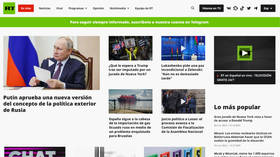RT Arabic has huge influence in Middle East – Politico
The growing popularity of the channel facilitates Russia’s “disinformation war” in the region, the outlet claims
Politico has sounded the alarm over the growing prominence of RT’s Arabic-language channel and website, warning that its success is all part of an alleged Russian “disinformation war” waged across the Middle East.
In an opinion piece published on Friday, H.A. Hellyer, a Carnegie Endowment scholar and a senior fellow at the Royal United Services Institute and Cambridge University, bemoaned the lack of suppression of Russian media in the region.
Hellyer referred to the Western policy of banning and sanctioning Russian outlets with the “invasion of Ukraine,” praising the “quick and decisive action” taken by the UK, the US and the EU against RT and Sputnik. It did not mention that Western hostility toward the outlets had arguably long preceded the ongoing conflict.
Russian media has thrived in the region due to a lack of pressure and bans from Middle Eastern countries, the author writes, claiming the outlets are attempting to wage a disinformation campaign there by “saturating social media with Kremlin talking points and undermining opposition figures.”
“RT Arabic is also one of the most popular news sites in the region, in some months outperforming even Al-Jazeera, while its YouTube channel has more dedicated subscribers than any other RT subsidiary,” Hellyer wrote, adding that its popularity only intensified after the beginning of the ongoing hostilities between Moscow and Kiev.
In total, RT Arabic’s social media platforms have garnered a combined 804 million views – a number that’s risen exponentially since February 2022.
Hellyer also complained about RT Arabic’s prolific social media team, claiming that the outlet “often posts content at two or three times the rate of Al-Jazeera or the BBC, and often multiple times.”
“The goal appears to be to overload the audience with a flurry of information that’s then retweeted and reposted ad nauseam and, thus, also serves to crowd out dissenting voices,” the author wrote, warning that the social media presence is delivering “pro-Kremlin propaganda … directly to younger generations in the Arabic-speaking world.”
The Politico piece is the latest in a series of op-eds published by Western media outlets in recent weeks that have brought attention to the growing prominence of RT Arabic. Late in March, Foreign Policy published a similar piece warning that Russia’s “disinformation machine” had a “Middle East advantage.”
The article, penned by Anna Borshchevskaya, a senior fellow at the Washington Institute for Near East Policy, also lamented that “in the Middle East, Russian state-run media have retained full access to airwaves throughout the Ukraine crisis.”
Nathaniel Greenberg, an associate professor of Arabic at George Mason University, wrote a similar piece in Euronews last week, claiming Moscow has been seeking to make Egypt “the linchpin” in the new Cold War with the West. The alleged goal, according to the author, owes much of its success to extensive “propaganda” and the “exploding” popularity of RT Arabic.
You can share this story on social media:








Comments are closed.